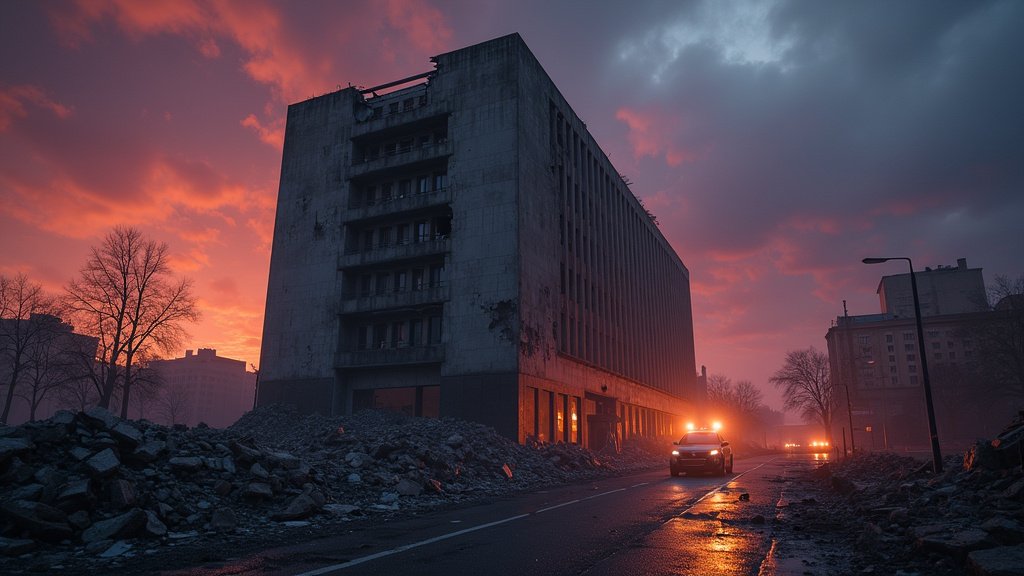Kyiv was plunged into tragedy as a massive Russian aerial attack, involving a barrage of nearly 600 drones and over 30 missiles, struck the Ukrainian capital, resulting in at least 21 fatalities, including four children. The deadliest assault since July also inflicted severe damage on the European Union’s delegation office and numerous other locations across the city, underscoring the escalating brutality of the conflict.
Ukrainian President Volodymyr Zelensky vehemently condemned the strikes, characterizing them as a deliberate message from the Kremlin to those advocating for peace and a rejection of diplomatic efforts. He reiterated calls for intensified international sanctions against Russia, emphasizing that Moscow’s actions demonstrate a clear intent to prolong the war rather than seek a resolution. The scale of the attack, which impacted over 30 sites in various districts, overwhelmed Ukraine’s air defense systems despite a significant number of interceptions.
Devastating Human Toll and Infrastructure Damage
The attack, which occurred overnight and continued into the early hours of Thursday, claimed the lives of at least 21 civilians, with officials reporting 48 others wounded, many critically. The Darnytskyi district was particularly hard-hit, with a five-story residential building suffering a direct missile strike, leading to partial collapse and trapping individuals beneath the rubble. Search and rescue operations were immediately launched, with emergency services working tirelessly to find survivors. Residential areas, a shopping mall, schools, and cultural institutions also sustained damage, highlighting the indiscriminate nature of the assault.
International Condemnation and Diplomatic Fallout
The European Union and Britain reacted swiftly, summoning Russian ambassadors to express their strong displeasure. EU foreign policy chief Kaja Kallas stated that no diplomatic mission should ever be a target, condemning the attack as a deliberate choice to escalate and mock peace efforts. European Council President António Costa expressed horror at the assault, vowing that the EU would not be intimidated. UK Prime Minister Sir Keir Starmer denounced the strikes as senseless and accused Russian President Vladimir Putin of sabotaging hopes for peace, calling for an end to the bloodshed. German Chancellor Friedrich Merz commented that Russia had “shown its true face again” with the attack.
The European Union delegation’s offices in Kyiv suffered significant damage from the shockwave of a nearby strike, a stark reminder to EU staff of the war’s proximity. While no EU personnel were reported injured, the attack on diplomatic premises drew widespread condemnation and reinforced the perception that Russia is deliberately escalating hostilities and disregarding international norms. The British Council offices also sustained damage, leading to their temporary closure.
Context and Escalation of Warfare
This large-scale aerial bombardment represents one of the most significant attacks on Kyiv in recent months. The Ukrainian Air Force reported that nearly 600 drones and 31 missiles were deployed across the country, indicating a concerted effort to overwhelm air defenses. While Ukrainian forces managed to intercept a substantial number of these projectiles, the sheer volume and intensity of the attack suggest that air defenses were severely tested. The assault comes at a time when diplomatic efforts, including recent high-level meetings, have failed to yield a ceasefire, leading many to believe Russia is actively rejecting pathways to peace.
Kyiv’s Mayor, Vitali Klitschko, declared Friday a day of mourning for the victims, a somber acknowledgment of the profound loss the city has endured. The devastating impact of this latest Russian attack underscores the ongoing humanitarian crisis and the urgent need for a lasting resolution to the conflict. The world news continues to follow the escalating situation, with the EU preparing further sanctions against Russia in response to these egregious actions.

